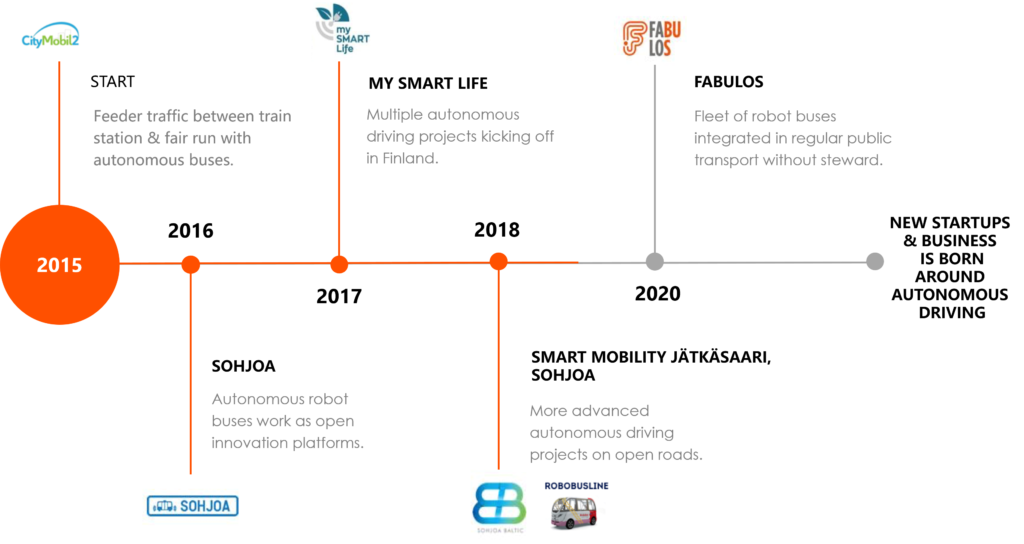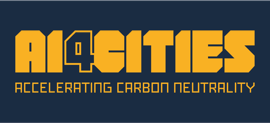Helsinki Smart Mobility Ecosystem
Why us?
Carrying out smart mobility pilots in Helsinki is easy.
They say that we are innovative and forward thinking. We are after all pioneers in creating new business around smart mobility.
But we think that our success is also based on our political, economic, social, technical, environmental, legal and (!) regulatory environment that enables testing and developing of cutting-edge technology and services.
The City of Helsinki’s goal is to develop their entire city into a platform for testing and enabling innovative business solutions. Jätkäsaari Mobility Lab addresses this in the smart mobility theme. You can find out more about other themes (such as EdTech, Built Environment and Health & Wellbeing) at testbed.helsinki website.
Automated transportation
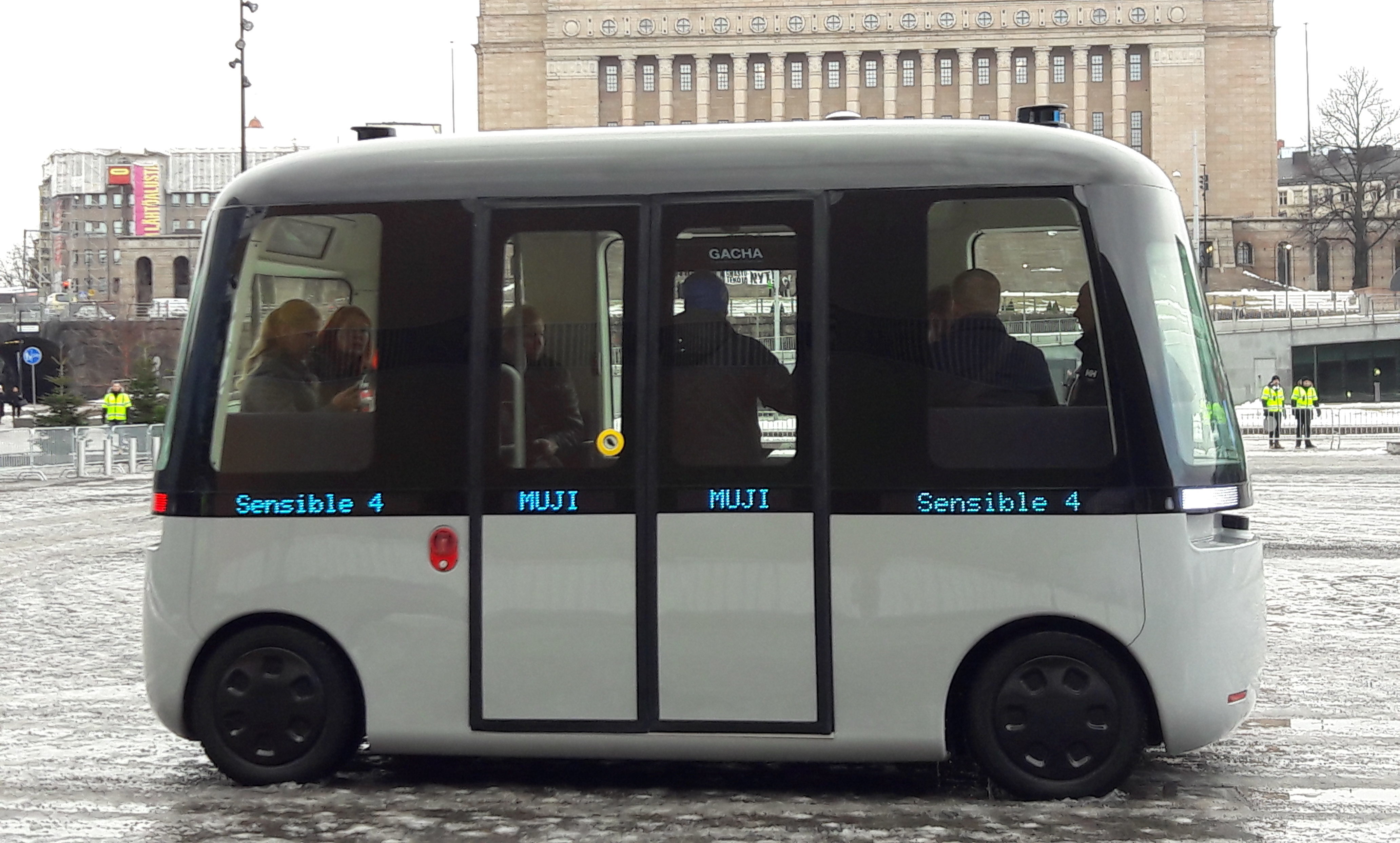
Helsinki, and Finland in general, are known for competences and development activities related to automation. KMPG, for example, ranked Finland at 6th place on their Autonomous Readiness Vehicle Index in 2019, especially excelling as the best in terms of regulations supporting of AV use, efficiency of legal system and the availability of latest technologies. Not to mention second highest number of AV tech firm headquaters per capita.
“Finland has a positive legal and regulatory environment. The traffic safety authority is quite permissive, granting permits for trials to anyone who is interested in experimenting with Avs. The entire road network is available for experimentation.” -Henry Beniard, Global Strategy Group, KPMG in Finland. [2019 AutonomousVehicles Readiness Index, KMPG 2019]
The figure below illustrates a timeline of automated driving pilots in Helsinki (with Forum Virium Helsinki, the city’s innovation company, as a partner).
City of Helsinki and other public sector actors are closely involved in facilitating and leading the development in this field of innovative piloting.
Even 5G networks are expanding in Finland and Helsinki, offering new opportunities for smart mobility. Helsinki collaborates actively with 5G technology providers.
MaaS
Helsinki and Finland is the home of MaaS – Mobility as a Service – that integrates various forms of transport services into a single mobility service accessible on demand, as described by the MaaS Alliance. The well-known Whim app by MaaS Global, for example, launched in Helsinki back in 2016, and has since spread to other countries.
The approach is to facilitate and encourage market driven services to flourish and create new innovations to address the needs of the users. The national Act on Transport Services that came into effect in 2018 mandates all transport service providers to provide not only data on their schedules, routes etc. but also to open their ticketing APIs for third parties. For more information, check e.g. information on submitting required information to the National Access Point.
The City of Helsinki does not develop or manage its own MaaS service.
On-demand services
HSL, the Helsinki Region Transport authority, had a smart, demand-responsive pilot Kutsuplus already in 2012-2015. In 2019, there have been different on-demand pilots developed in Helsinki region by e.g. Kyyti Group and ViaVan (in collaboration with HSL). Some directed at the general public for providing first/last mile connections to metro stations, some dedicated to providing school children with after-school transportation to hobbies (instead of parents driving them around later in the evening).
The Act on Transport Services that came into effect in 2018 changed the landscape in Finland for taxis and ride-hailing services. For example, it removed the cap on taxi permits, price ceilings as well as location and time based requirements on taxi availability. Since then, the number of taxis increased, especially in the capital region (see e.g. Traficom’s news article). Now, in 2020, the effects of the changes are being assessed to determine if and how it needs revising.
City bike scheme
According to a study done in 2019, the city bikes in Helsinki are the most popular ones in the world. The study compared 50 cities from around the world. [See the result presentation here, in Finnish]
The popular city bike service is a public-private collaboration between HKL, Espoo Technical and Environment Services, CityBike Finland, HSL, ClearChannel and HOK Elanto.
HKL and Espoo City Technical and Environment Services run the system in Helsinki and Espoo, respectively. The costs are covered by advertisement, sponsorship and usage fees. The current service is contracted until 2026.
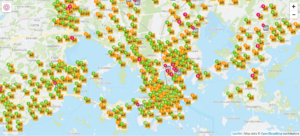
The service coverage has grown over the years. In 2019, there were 3 450 bikes with 345 stations while in 2021 it included about 4 600 bikes and 460 stations across the cities of Helsinki and Espoo.
Statistics for 2018 for example:
• 6.8 trips a day per bike (2018)
• 3 200 000 bike trips in total
• 2 km per ride
• 48 500 seasonal passes (excl. daily subscriptions)
In 2019, a total of 3,7 million trips in Helsinki & Espoo (7 trips per day per bike with about 260 stations and 240o bikes; 60 000 season passes)
In 2020, 2,6 million trips were done in Helsinki, 0,4 million in Espoo.
In 2021, 2,4 million trips were done in Helsinki, 0,4 million in Espoo.
More info on the city bike scheme is available at https://kaupunkipyorat.hsl.fi/en/helsinki/about. And here you can read more about other bike services offered by Helsinki City Transport (HKL).
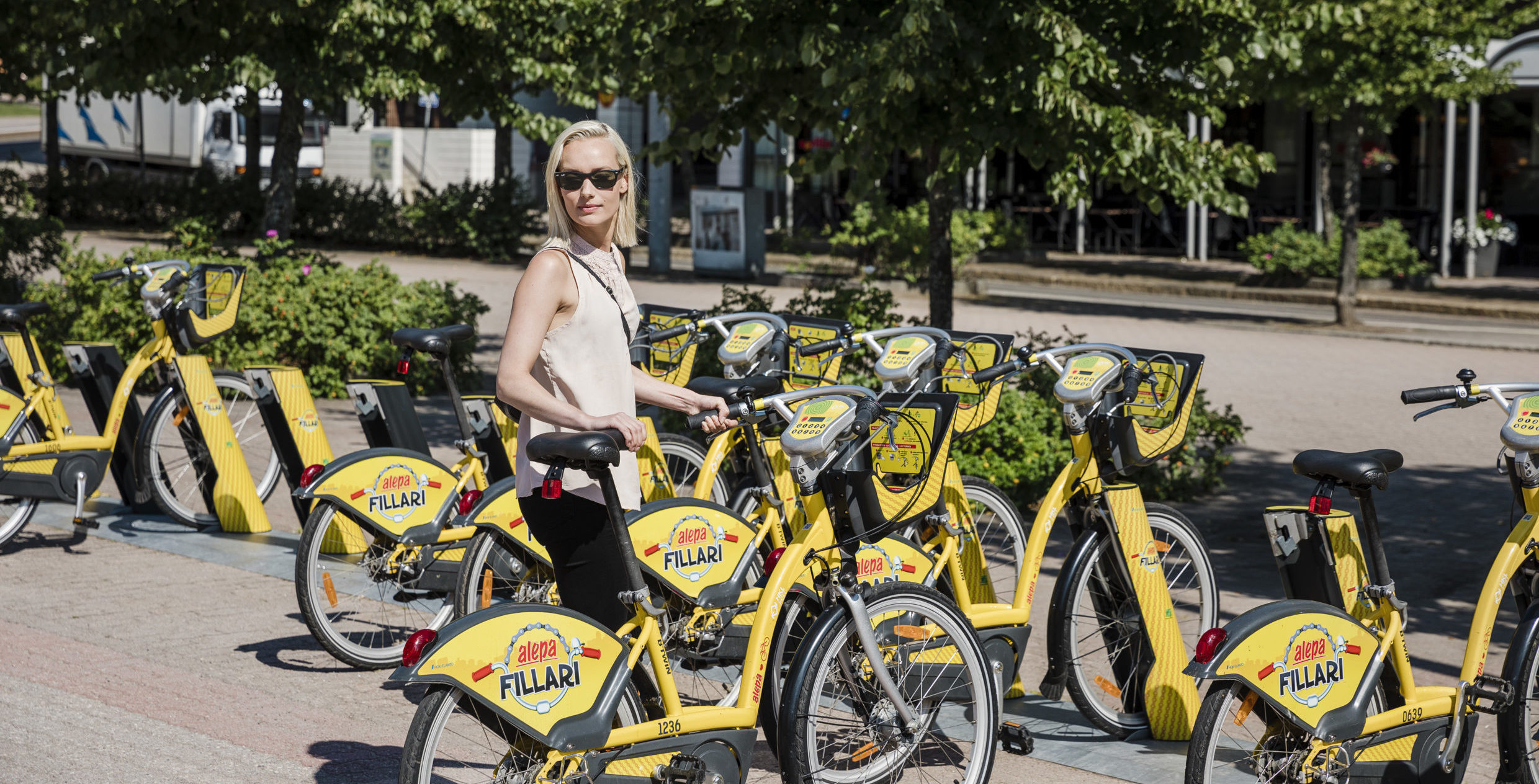
E-Scooters
In 2019, there were six e-scooter companies operating in Helsinki, and new ones are also welcome. The companies, local and international, serviced a total of 1,8 million trips during the year.
In 2021, the most prominent e-scooter companies in Helsinki were (in alphabetical order) Dott, Lime, Tier and Voi.
While the city does not specific enforced regulations for micromobility services like e-scooters (they are regulated on a national level, see Traficom’s info on electronic personal transportation devices, and essentially follow the same rules as bikes), the city has dialogue with the operators and has in collaboration defined guidelines and best practices to follow. These include, for example, practices regarding managing customer feedback, organizing removal of the devices when necessary, user instructions and communications, data and geo-fencing capabilities.
Similarly, winter-specific practices and limitations have been agreed with the operators, such as:
• lower speed limits are applied during the winter months (reduced from 25km/h)
• readiness to collect/deactivate e-scooters during icy and particularly snowy period
Also the amount of e-scooters and the operational zones is reduced during winter.
E-scooter guidelines for users:
• E-scooters are not allowed on sidewalks
• Use of helmet is recommended by the Finnish Police
• User can be held responsible for parking of the e-scooter to a place where it can cause immediate danger
• Scootering while intoxicated is illegal
Note: the guidelines above are examples of what have been agreed, not necessarily up-to-date e.g. with regards to speed limits or operating times.
Maritime Solutions
Smart mobility in Helsinki is also making advances in maritime transport. Areas of development include a for-profit peer-to-peer platform for on-demand boat rides, autonomous vessels, increasingly automated data transfer, a smart channel, remote control of vessels and smart port logistics.
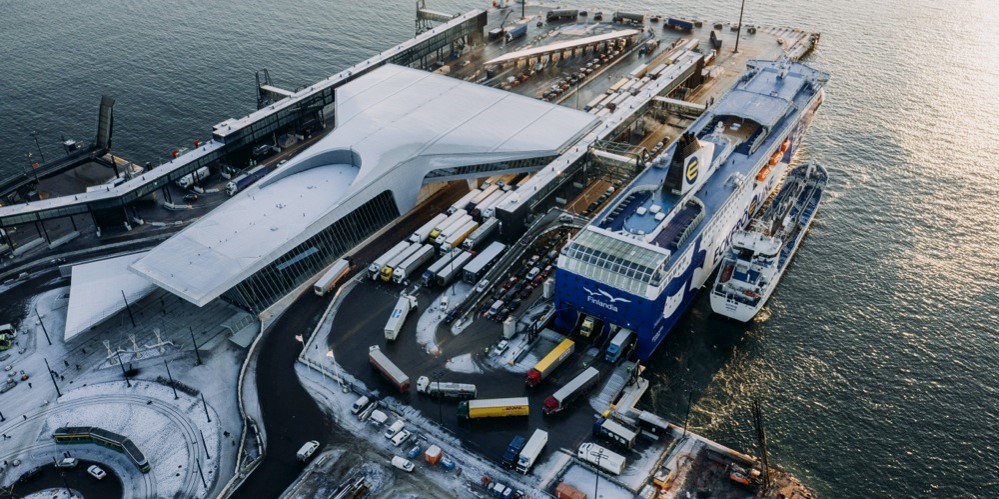
Open data, APIs + Source code
Helsinki and Finland have a long tradition in openness and transparency of data and APIs.
The Helsinki region journey planner launched its open interfaces for developers in 2009 and as an open source code version in 2017 (https://digitransit.fi/en/). In 2019, Digitransit is used in several Finnish cities and is also exported to Estonia.
Data ranging from national road and traffic data (Digiroad, Digitraffic) to detailed city-level data and 3D city models is already openly available for analysis and further use. One of the largest local initiatives for opening of public data has been Helsinki Region Infoshare (HRI). HRI catalogues hundreds of datasets and APIs produced and available in the region: www.hri.fi.
The legislative Act on Transport Services aims to facilitate and ensure availability of services through e.g. requirements on the openness of information and ticketing APIs (see Regulation section below). The national open transport service catalogue NAP – national access point – is available at www.finap.fi
For more info on data available in Jätkäsaari, Helsinki and Finland, click here.
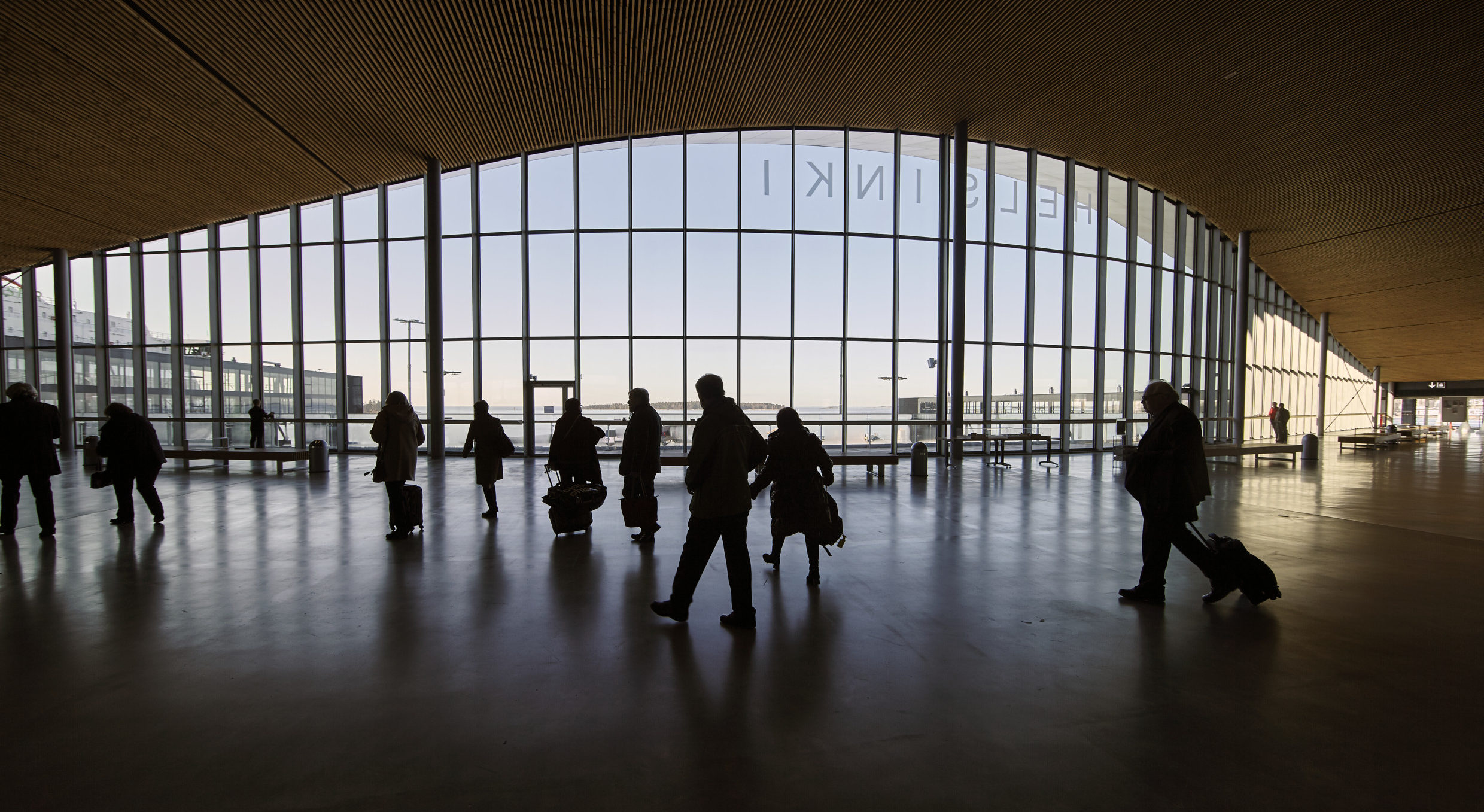
Regional Authorities + Infrastructure Providers
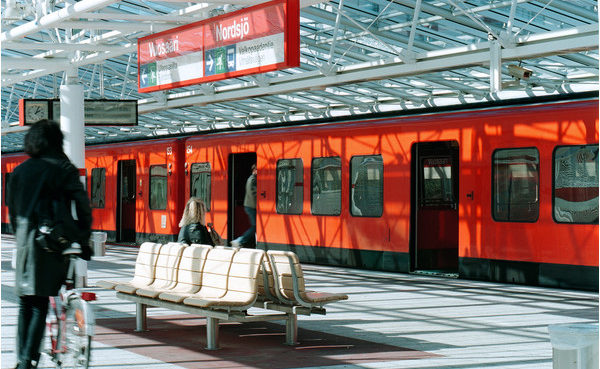
HSL – Helsinki Region Transport is a joint local authority for Helsinki region municipalities.
HSL is responsible for the preparation of the Helsinki Region Transport System plan as for planning and organizing public transport services, including ticket sales and pricing. HSL procures the regional bus, tram, Metro, ferry and commuter train services. More than 1 million daily journeys are travelled by HSL services, accounting for around 60% of all public transport trips in Finland.
HSL has set ambitious targets for emissions reduction (90% reduction of CO2 by 2025 from 2010 levels). By 2025, 30 % of the buses will be running on electricity generated in a sustainable manner in the Nordics (e.g. wind, hydro or solar). HSL also allocates bonuses to operators for emission-reducing actions. See e.g. this presentation for more info in Finnish.
HKL – Helsinki City Transport is responsible for operating the trams and the metro as well as for the construction and maintenance of tracks, stations and depots.
Finnish Transport and Communications Agency Traficom is the national authority for licence, permit, registration and approval matters.
Port of Helsinki, owned by the city of Helsinki, operates one of the busiest passenger ports in Europe. Port of Helsinki Ltd creates a seamless framework for sea traffic to destinations such as Tallinn and Stockholm. In 2018, a total of 12.1 million passengers traveled through the Port of Helsinki.
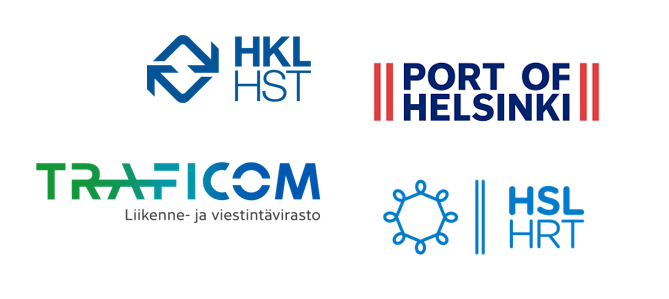
Research + Innovation
Forum Virium Helsinki is an innovation company owned by the City of Helsinki. Forum Virium Helsinki co-creates urban futures together with companies, universities, other public sector organizations and Helsinki residents.
AALTO University is a multidisciplinary university specialising in art, technology and business.
Finnish Meteorological Institute performs meteorological research and produces weather services and open data to meet the needs of e.g. transport.
UNIVERSITY OF HELSINKI is Finland’s largest and oldest academic institution. Today, this multidisciplinary academic community solves problems that concern all of us, also on the global scale.
METROPOLIA University of Applied Sciences Finland’s largest university of applied sciences, educates the professionals of tomorrow in the fields of Business, Culture, Health care and Social services, and Technology.
VTT Technical Research Centre of Finland Ltd. is a government owned multidisciplinary applied research company.
Finnish Center for Artificial Intelligence (FCAI) is a community of experts that brings together top talents in academia, industry and the public sector to solve real-life problems using both existing and novel AI.
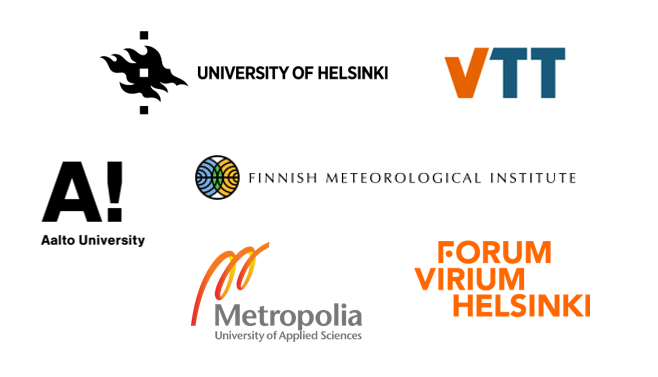
Funding + Business support
BUSINESS FINLAND is the Finnish government organization for innovation funding and trade, travel and investment promotion.
Smart Mobility Finland program supports Finnish companies to benefit from the changing transport sector and attracts international players to join Finnish testbeds.
NewCo Helsinki provides both business advisory supports and coaching for small companies as well as startup services for foreign entrepreneurs in Helsinki.
Helsinki-based startups can apply for travel grants to support their international expansion.
Regulation
Close involvement of authorities and other key stakeholders makes it easier to solve things as they come up – Agile approach with e.g. drones and automation helps a great deal.
Enabling approach to legislation: solving problems and breaking down obstacles for new ways of doing things
Strong and close cooperation between government, cities, companies and the research community
Co-creative mindset, willingness to try out new things and finding innovative ways to accomplish set goals.
Useful sources of information;
Brief introduction to Act on Transport Services on the Ministry of Transport and Communication’s press release 28.3.2019.
Obligations regarding opening mobility service interfaces
Report on ITS standardization activities in Finland (YTL, ITS Finland, ITS Factory & Infotripla 2020)

Strategies and development plans
Here are some reports, development plans and strategies related to transport and smart mobility.
In English:
- Helsinki City Strategy 2021-2025 (EN)
- Helsinki Intelligent Transport System Development Programme 2030 (EN, pdf, 2019)
- Helsinki Digitalization Programme (EN, pdf)
- Helsinki Data Strategy (EN)
- Carbon-Neutral Helsinki 2035 Action Plan (EN, pdf, 2018)
- Analysis of Future Transport in the City of Helsinki (EN, pdf, 2020)
- Roadmap for Tourism 2018-2021 (EN, pdf)
- Land use, housing and transport plan 2019 summary report (EN, pdf, MAL 2019)
Suomeksi (in Finnish):
- Helsingin kaupunkistrategia 2021-2025 (FI, pdf)
- Hiilineutraali Helsinki 2035 -toimenpideohjelma (FI, pdf)
- Helsingin Datastrategia (FI, pdf)
- Helsingin älyliikenteen kehittämisohjelma 2030 (FI, pdf, 2019)
- Helsingin pysäköintipolitiikka 2022 (FI, pdf, luonnos 2021)
- Helsingin citylogistiikan toimenpideohjelman päivittäminen (FI, pdf, 2020)
- Pyöräliikenteen kehittämisohjelma (FI, pdf, 2020)
- Pyöräpysäköinnin yleissuunnitelma ja toteutusohjelma 2021-2025 (FI, pdf, 2021)
- Matkailun tiekartta 2018-2021 (FI, pdf)
- Helsingin liikenteen tulevaisuusanalyysi (FI, pdf, 2020)
- Helsingin meluntorjunnan toimintasuunnitelma 2018-2022 (FI, pdf, 2018)
- Kestävä kaupunkiliikkuminen Helsingissä (SUMP) (FI, pdf, 2017)
- Helsingin kaupungin ilmansuojelusuunnitelma 2017-2024 (FI, pdf, 2016)
